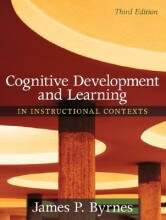Samenvatting: Psychology 8Th Edition | 9781319150518 | Peter O Gray, et al
- Deze + 400k samenvattingen
- Een unieke studie- en oefentool
- Nooit meer iets twee keer studeren
- Haal de cijfers waar je op hoopt
- 100% zeker alles onthouden
Lees hier de samenvatting en de meest belangrijke oefenvragen van Psychology 8th Edition | 9781319150518 | Peter O. Gray; David Bjorklund
-
1 Uitgangspunten psychologie
Dit is een preview. Er zijn 326 andere flashcards beschikbaar voor hoofdstuk 1
Laat hier meer flashcards zien -
Wat is de algemene definitie van psychologie?
De wetenschap die het gedrag en geest (bewust en onbewust) van mensen bestudeert -
Wat zijn de 3 fundamenten van de psychologie
1. Gedrag & mentale ervaringen hebben een fysieke oorzaak en kunnen dus onderworpen worden aan wetenschappelijke analyse. = Dualisme Descartes, Materialisme Hobbes
2. De manier waarop een persoon zich gedraagt, denkt en voelt veranderd door de ervaringen van de persoon en omgeving. = Empiricisme, Nativisme Kant
3. De lichamelijke machine die gedrag en mentale ervaringen produceert is een product van evolutie door natuurlijke selectie. Evolitietheorie Darwin
1. Fysieke oorzaak
2. Oorzaak ervaring en omgeving
3. Natuurlijke selectie -
Wat Maakt 'The Principles of Psychology' Geschreven door William James zo sterk?
William probeert de lezer mee te verwikkelen in het analyseren van de moeilijke concepten gebaseerd op zijn twee principes. We zijn rationalisten en ook functionalisten. -
Wie is Wilhelm Wundt?
1879, grondlegger van de psychologie -
What is in the definition of psychology meant by behavior?
Gedrag (in de definitie van psychologie) verwijst naar alle observeerbare acties van een persoon of een dier -
Wat zijn de principiële vragen van psychologie?
- Waaromvoelen , denken engedragen mensen zich zoals ze doen?
- Zijn wij het resultaat van ons genen, ons ervaringen of beide?
- Hoe belangrijk zijn ons goals versus ons verleden, om te bepalen wat we doen?
- Is er een scheiding tussen mind en body? -
Wat maakt psychologie een veelzijdig vakgebied?
Omdat psychologie in het grijze gedeelte tussen de natuur- en geesteswetenschappen valt. -
Wat was Descartes zijn versie van dualisme en hoe heeft het meegeholpen aan de visie van psychologie?
Descartes geloofde dat het lichaam een complexe machine was, die instaat was om zijn eigen warmte te genereren en zelfs zonder na bemoeienis van de geest zichzelf kon sturen. Ook al was er weinig bekend van het zenuwstelsel toen die tijd, zat Descartes er niet ver vanaf. -
Welke proces doorging de wetenschap van psychologie vooraleer ze echt greep kreeg in de wereld?
De zaadjes werden door de oude- Griekse filisofen geplant en zijn tijdens de renaissance begonnen te ontkiemen. Vanaf de 18e eeuw, de periode van verlichting is het echt beginnen te ontkiemen. -
Wat is de definitie van wetenschap?
Alle pogingen om vragen te beantwoorden door de systematische verzameling en logische analyse van objectieve observeerbare data.
- Hogere cijfers + sneller leren
- Niets twee keer studeren
- 100% zeker alles onthouden
Onderwerpen gerelateerd aan Samenvatting: Psychology 8Th Edition
-
Foundation of the Study of Psychology
-
Methodologie - Lessons From Clever Hans
-
Methodologie - Types of Research Strategies
-
Methodologie - Statistical Methods in Psychology
-
Methodologie - Minimizing Bias in Psychological Research
-
Genetics and Evolutionairy Foundations of Behavior
-
The Neural Control of Behavior - Neurons: The building Blocks of the Brain
-
The Neural Control of Behavior - Methods of Mapping the Brain’s Behavioral Functions
-
The Neural Control of Behavior - Functional Organization of the Nervous System - Peripheral nerves: the nervous system’s interface with the world
-
The Neural Control of Behavior - Functional Organization of the Nervous System - The spinal cord: a conduit and an organizer of simple behaviors
-
The Neural Control of Behavior - How Hormones Interact With the Nervous System
-
The Neural Control of Behavior - Hemispheric Differences in the Cerebral Cortex
-
The Neural Control of Behavior - Changes in the Brain Over Time
-
General Principles of Motivation - Varieties of Drives
-
Reward Mechanisms of the Brain
-
Hunger: An Example of a Regulatory Drive - Neural and Hormonal Control of Appetite
-
Hunger: An Example of a Regulatory Drive - Problems of Obesity
-
The Sleep Drive - Description of Sleep as a Physiological and Behavioral State
-
The Sleep Drive - Theories About the Functions of Sleep
-
The Sleep Drive - Brain Mechanisms Controlling Sleep
-
Foundations for Understanding Emotions - The Nature and Value of Emotions
-
Foundations for Understanding Emotions - Effects of Bodily Responses on Emotional Feelings
-
Foundations for Understanding Emotions - Brain mechanisms of Emotion
-
Smell, Taste, Pain, Hearing and Psychophysics - Overview of Sensory Processes
-
Smell, Taste, Pain, Hearing and Psychophysics - Psychophysics
-
Smell, Taste, Pain, Hearing and Psychophysics - Smell - Anatomy and Physiology of Smell
-
Smell, Taste, Pain, Hearing and Psychophysics - Taste - Anatomy and Physiology of Taste
-
Smell, Taste, Pain, Hearing and Psychophysics - Pain - Neural Pathways for Pain
-
Smell, Taste, Pain, Hearing and Psychophysics - Hearing - Sound and Its Transduction by the Ear
-
Smell, Taste, Pain, Hearing and Psychophysics - Hearing - Pitch Perception
-
The Psychology of Vision - How the Eye Works
-
The Psychology of Vision - Seeing Forms, Patterns, Objects and Faces
-
The Psychology of Vision - Seeing in Three Dimensions
-
The Psychology of Vision - Multisensory Perception: Combining Senses
-
Memory, Attention, and Consciousness
-
Learning and thinking - How People Reason I: Analogies and Induction
-
Learning and thinking - The Practice and Theory of Intelligence Testing
-
The Development of Body, Thought, and Language
-
Growth of the mind and person - Parenting Styles
-
Growth of the mind and person - The Roles of Play and Gender in Development
-
Growth of the mind and person - Adolescence: Breaking Out of the Cocoon
-
Growth of the mind and person - Adulthood: Finding Satisfaction in Love and Work
-
Social and personality psychology - Forming Impressions of Other People
-
Social and personality psychology - Perceiving and Evaluating the Self
-
Social and personality psychology - Effects of Others' Examples, Opinions and Requests
-
Personality - Personality as Behavioral Dispositions of Traits
-
Psychological Disorders - Problems in Identifying Psychological Disorders
-
Psychological Disorders - Causes of Psychological Disorders
-
Psychological Disorders - Schizophrenia
-
Treatment of Psychological Disorder - Care as a Social Issue
-
Treatment of Psychological Disorder - Biological Treatments
-
Treatment of Psychological Disorder - Psychotherapy II: Behavorial and Cognitive Therapies































